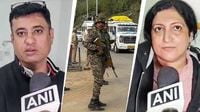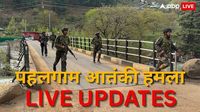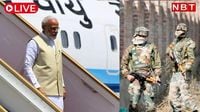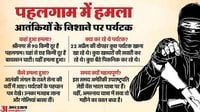In a shocking and brutal attack on April 22, 2025, tourists in the picturesque Baisaran Valley of Pahalgam, Jammu and Kashmir, became the targets of a coordinated terrorist assault that left more than 27 individuals dead and over 20 injured. The attack, described as the most significant since the 2019 Pulwama incident, occurred during a peak tourist season, raising serious concerns about safety in the region.
As the violence unfolded, Prime Minister Narendra Modi, who was in Saudi Arabia at the time, immediately altered his schedule and returned to India. The gravity of the situation prompted him to call for an emergency meeting of the Cabinet Committee on Security (CCS) upon his arrival in New Delhi. Reports indicate that Modi will address the nation regarding the attack and outline the government's response.
The assault took place around 2:45 PM, when a group of tourists was enjoying horseback riding in the valley, often referred to as "Mini Switzerland" for its stunning natural beauty. Eyewitness accounts reveal that the attackers, dressed in police uniforms, approached the tourists, asked for their names, and opened fire upon identifying them as members of the Hindu community. This targeted approach has led authorities to classify the incident as a religiously motivated attack.
Among the deceased are two foreign nationals—a tourist from Nepal and another from the UAE—as well as a 26-year-old Indian Navy officer, Lieutenant Vinay Narwal, who was on holiday with his family. The attack has drawn widespread condemnation from leaders across the globe, including U.S. President Joe Biden and Italian Prime Minister Giorgia Meloni, both of whom expressed their condolences and solidarity with the victims' families.
Home Minister Amit Shah arrived in Srinagar shortly after the attack, where he held meetings with local officials, including Jammu and Kashmir’s Lieutenant Governor Manoj Sinha and Chief Minister Umar Abdullah. Shah emphasized that those responsible for this heinous act would face severe consequences, stating, "We will not spare anyone involved in this cowardly act of terrorism." He also announced plans for a comprehensive review of security measures in the region.
As the investigation unfolds, authorities have confirmed that four terrorists were involved in the attack, three of whom are believed to be Pakistani nationals, with the fourth being a local Kashmiri. The terrorist group Lashkar-e-Taiba has reportedly claimed responsibility for the attack, highlighting the ongoing threat posed by militant organizations in the region.
The attack has raised alarms about the safety of tourists in Jammu and Kashmir, a region that has seen a resurgence of violence in recent months. With the Amarnath Yatra pilgrimage set to begin in July, officials are under pressure to ensure the safety of thousands of pilgrims expected to visit the area. This incident has prompted local administrations to temporarily halt tourist activities in the Baisaran Valley and surrounding areas.
In response to the attack, schools in Pahalgam will remain closed on April 23, 2025, as a mark of respect for the victims. Local residents organized a candlelight vigil and a flag march to honor those who lost their lives and to protest against the violence. The community's response reflects a collective grief and determination to stand against terrorism.
Prominent political figures have also reacted to the tragedy. Congress leader Sonia Gandhi expressed her sorrow, stating, "I am deeply saddened and shocked by the brutal terrorist attack on innocent tourists. Violence is a cowardly act that must be condemned in the strongest terms." She emphasized the need for unity against such divisive acts of violence.
Former Chief Minister Mehbooba Mufti called for a thorough investigation into the attack, urging the government to understand the underlying issues that contribute to such violence. She stated, "This is not just an attack on tourists; it is an attack on the very fabric of Kashmiriyat, the shared identity of our region."
As the investigation continues, security forces have launched a massive manhunt to apprehend the attackers. Joint operations involving the Indian Army and Jammu and Kashmir Police have been initiated, with helicopters deployed to assist in the search and evacuation of injured tourists.
The Pahalgam attack is a stark reminder of the fragile security situation in Jammu and Kashmir, where tourism has been a vital part of the local economy. The region, known for its breathtaking landscapes, has been striving to recover from years of conflict, and incidents like this threaten to undermine those efforts.
In the wake of this tragedy, it is crucial for the government to reinforce security measures, not only to protect tourists but also to restore confidence among the local population. The attack has sparked a renewed debate about the effectiveness of current security protocols and the need for a more comprehensive approach to counter-terrorism in the region.
As the nation mourns the loss of innocent lives, there is a collective hope that justice will be served, and that such acts of violence will not deter the spirit of unity and resilience that defines the people of India.










